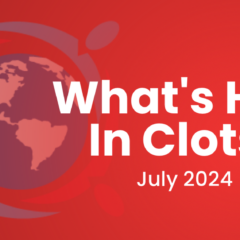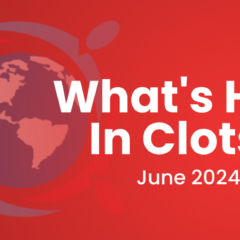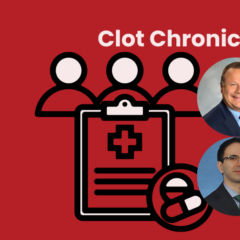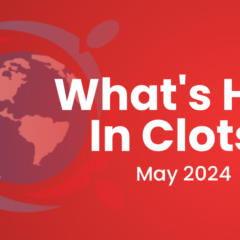Last updated on
Clot Chronicles: A Look at 2019
Dr. Sam Goldhaber discusses some of the developments in cardiovascular health expected to come in 2019.
Hello, this is Dr. Sam Goldhaber. I am president of NATF, and today on the Clot Chronicles, I am going to discuss new treatments to prevent and treat thrombosis in 2019.
Let’s start with ways to reduce the LDL cholesterol level. The LDL cholesterol is the so-called “bad” cholesterol. There is no longer any “normal” range for LDL cholesterol. The lower the number, the better. The lower the number, the fewer heart attacks and the fewer strokes. In the olden days, an LDL cholesterol up to 120 mg/dL was considered acceptable. Then, the number dropped to 100 mg/dL and then, in another trial, the new number became 70 mg/dL. Then, in a trial two years ago, it went down to 52 mg/dL. Now, in trials just completed, there is no lowest number.
Numbers of LDL cholesterol in the 30s and 40s are considered best. We can sometimes achieve these low LDL cholesterol levels with a statin drug, such as rosuvastatin or atorvastatin. Sometimes we add ezetimibe, which is also called Zetia. But, sometimes we go to the PCSK9 inhibitors, which are injectable and are used on top of the statins. They can pretty reliably get that LDL cholesterol level down to the 30s or 40s. They are injectable medications. They used to be extremely expensive and require, sometimes, weeks of negotiation with insurance companies to get coverage, but very recently the manufacturers of these new PCSK9 inhibitors have dropped the price by about 70 percent so that they are in the very affordable range as far as cardiovascular drugs go. They should be easy to access in 2019.
Now, we’ve paid very little attention to the triglycerides levels. Triglycerides are measured at the same time that cholesterol levels are measured. In the past, we’ve dismissed the triglyceride levels as not being very important, but a trial called REDUCE-IT was just published at the end of November 2018 and this showed with a particular type of fish oil, called vascepa, given 2 grams twice a day, that there was a remarkable reduction in heart attack and stroke in the patients who received the fish oil with elevated triglycerides levels compared to the placebo group. Now, it was surprising to those of us who have studied triglyceride levels that simply reducing the triglyceride level could have such a large magnitude of benefit. It turns out that about 10 percent of the patients in REDUCE-IT actually had normal triglyceride levels and even those patients had about a 25 percent reduction in heart attack and stroke.
I think in 2019 we will also see, for patients who have coronary artery disease or peripheral arterial disease, the use of very low doses of Xarelto, 2.5 mg twice a day, in combination with a baby aspirin tablet to prevent heart attack, stroke, and problems with major adverse limb complications, such as those that might require bypass surgery of the leg arteries for example.
So, I think that 2019 is going to be a terrific year. We should go back to our doctors and ask our doctors whether we are eligible for the treatments of the COMPASS trial or the REDUCE-IT trial, or whether we merit the addition of PCSK9 inhibitors on top of statin therapy.
This is Dr. Sam Goldhaber, signing off on the Clot Chronicles



